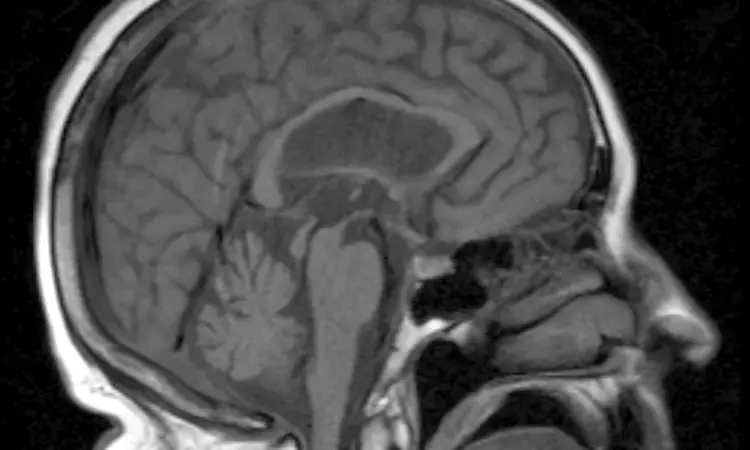- Home
- Medical news & Guidelines
- Anesthesiology
- Cardiology and CTVS
- Critical Care
- Dentistry
- Dermatology
- Diabetes and Endocrinology
- ENT
- Gastroenterology
- Medicine
- Nephrology
- Neurology
- Obstretics-Gynaecology
- Oncology
- Ophthalmology
- Orthopaedics
- Pediatrics-Neonatology
- Psychiatry
- Pulmonology
- Radiology
- Surgery
- Urology
- Laboratory Medicine
- Diet
- Nursing
- Paramedical
- Physiotherapy
- Health news
- Fact Check
- Bone Health Fact Check
- Brain Health Fact Check
- Cancer Related Fact Check
- Child Care Fact Check
- Dental and oral health fact check
- Diabetes and metabolic health fact check
- Diet and Nutrition Fact Check
- Eye and ENT Care Fact Check
- Fitness fact check
- Gut health fact check
- Heart health fact check
- Kidney health fact check
- Medical education fact check
- Men's health fact check
- Respiratory fact check
- Skin and hair care fact check
- Vaccine and Immunization fact check
- Women's health fact check
- AYUSH
- State News
- Andaman and Nicobar Islands
- Andhra Pradesh
- Arunachal Pradesh
- Assam
- Bihar
- Chandigarh
- Chattisgarh
- Dadra and Nagar Haveli
- Daman and Diu
- Delhi
- Goa
- Gujarat
- Haryana
- Himachal Pradesh
- Jammu & Kashmir
- Jharkhand
- Karnataka
- Kerala
- Ladakh
- Lakshadweep
- Madhya Pradesh
- Maharashtra
- Manipur
- Meghalaya
- Mizoram
- Nagaland
- Odisha
- Puducherry
- Punjab
- Rajasthan
- Sikkim
- Tamil Nadu
- Telangana
- Tripura
- Uttar Pradesh
- Uttrakhand
- West Bengal
- Medical Education
- Industry
PET imaging with F-18 Florzolotau promising for diagnosing rare brain disorder

China: PET imaging with F-18 Florzolotau, an experimental radiotracer, holds promise for the diagnosis of early progressive supranuclear palsy (PSP), reveals a study featured in the European Journal of Nuclear Medicine and Molecular Imaging.
"18F-Florzolotau PET imaging can effectively capture regional vulnerability and distribution patterns of tau pathology in progressive supranuclear palsy, the researchers wrote. "The 18F-Florzolotau modified staging system is promising for early tracking of tau deposition in living brains."
Progressive supranuclear palsy is a rare brain disorder that leads to problems with walking, movement, and balance. Currently, there are no treatments for the disease nor definitive imaging approaches for its detection. Till now, MRI has been considered the most useful diagnostic tool for the disorder.
Human postmortem studies have indicated that brain tau pathology -- particularly the presence of the four-repeat (4R) form of tau protein -- plays an essential role in PSO and that PET can illuminate this pathology. Feng-Tao Liu from Fudan University in Shanghai, China, and colleagues aimed to investigate whether 18F-Florzolotau PET imaging may capture the regional vulnerability and distribution patterns of tau pathology in PSP and devise a novel image-based staging system.
The study cohort comprised 148 consecutive patients with progressive supranuclear palsy who had undergone 18F-Florzolotau PET imaging. Disease severity was measured using the PSP rating scale (PSPrs). Differences and similarities of tau deposition among different clinical phenotypes were assessed at the regional and voxel levels.
An 18F-Florzolotau pathological staging system was devised per the scheme initially developed for postmortem data. The researchers further developed an 18F-Florzolotau modified staging system by cluster integration at the regional level. Analysis of variance assessed the ability of 18F-Florzolotau staging systems to indicate disease severity with regards to PSPrs score.
The researchers reported the following findings:
- The distribution patterns of 18F-Florzolotau accumulation in PSP's living brains showed a remarkable similarity to those reported in postmortem studies. The binding intensity was markedly higher in Richardson's syndrome.
- 18F-Florzolotau PET imaging allowed regional vulnerability detection and tau accumulation tracking earlier than postmortem immunostaining.
- The 18F-Florzolotau staging systems were positively correlated with clinical severity as reflected by PSPrs scores.
"18F-Florzolotau PET imaging can effectively reflect the characteristic accumulation of tau pathology in progressive supranuclear palsy," the researchers wrote. "The 18F-Florzolotau PET modified staging system allowed disease severity assessment and early tracking of tau deposition."
"Patients with PSP should be followed longitudinally concerning the distribution patterns to assess whether this classification may inform prognosis," they conclude.
Reference:
Liu, FT., Lu, JY., Li, XY. et al. 18F-Florzolotau PET imaging captures the distribution patterns and regional vulnerability of tau pathology in progressive supranuclear palsy. Eur J Nucl Med Mol Imaging (2023). https://doi.org/10.1007/s00259-022-06104-0
Dr Kamal Kant Kohli-MBBS, DTCD- a chest specialist with more than 30 years of practice and a flair for writing clinical articles, Dr Kamal Kant Kohli joined Medical Dialogues as a Chief Editor of Medical News. Besides writing articles, as an editor, he proofreads and verifies all the medical content published on Medical Dialogues including those coming from journals, studies,medical conferences,guidelines etc. Email: drkohli@medicaldialogues.in. Contact no. 011-43720751


